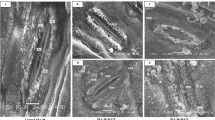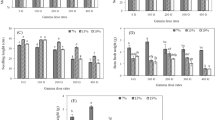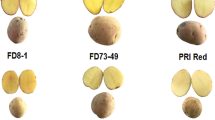Abstract
POTATOES (var. Up-to-date), which were free from sprouting, were packed in polyvinyl chloride bags and irradiated with 8,000 and 12,000 rads of γ-rays during a ‘shut-down’ period of the swimming-pool-type reactor Apsara. The dose-rate during the period of irradiation was 200 rads/min. Based on a sample of 81 potatoes in each case, the numbers sprouting, 35 days after irradiation, were 81 in control, 9 with a dose of 8,000 rads and none with a dose of 12,000 rads.
This is a preview of subscription content, access via your institution
Access options
Subscribe to this journal
Receive 51 print issues and online access
$199.00 per year
only $3.90 per issue
Buy this article
- Purchase on Springer Link
- Instant access to full article PDF
Prices may be subject to local taxes which are calculated during checkout
Similar content being viewed by others
References
Rubin, B. A., and Metlitsky, L. V., Proc. Second U.N. Int. Conf. Peaceful Uses of Atomic Energy, Geneva, 27, 437 (1958).
Research Group, National Defence Establishment, Paris and Conservatome Society, Lyon, ibid., 27, 434 (1958).
Author information
Authors and Affiliations
Rights and permissions
About this article
Cite this article
MATHUR, P. Reversal of γ-Ray-induced Dormancy of Potato Tubers by Gibberellic Acid. Nature 190, 547–548 (1961). https://doi.org/10.1038/190547a0
Issue Date:
DOI: https://doi.org/10.1038/190547a0
This article is cited by
-
The effect of growth regulators on sodium azide induced genetic damage in barley
Biologia Plantarum (1980)
-
The use of adventitious buds to prevent chimerism in mutation breeding of potato
Euphytica (1973)
-
Post-irradiation modulation of ionizing radiation damage to plants
The Botanical Review (1971)
-
The effect of Gibberellic acid on chromosomal aberrations in EMS and MMS treated Pisum sativum linn.
Theoretical and Applied Genetics (1971)
-
Reversal of some Effects of Gamma-irradiation by the Ethyl Ester of Gibberellic Acid
Nature (1965)
Comments
By submitting a comment you agree to abide by our Terms and Community Guidelines. If you find something abusive or that does not comply with our terms or guidelines please flag it as inappropriate.



